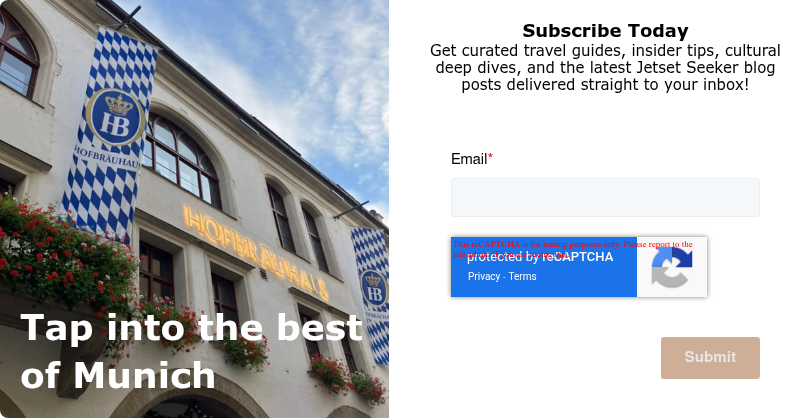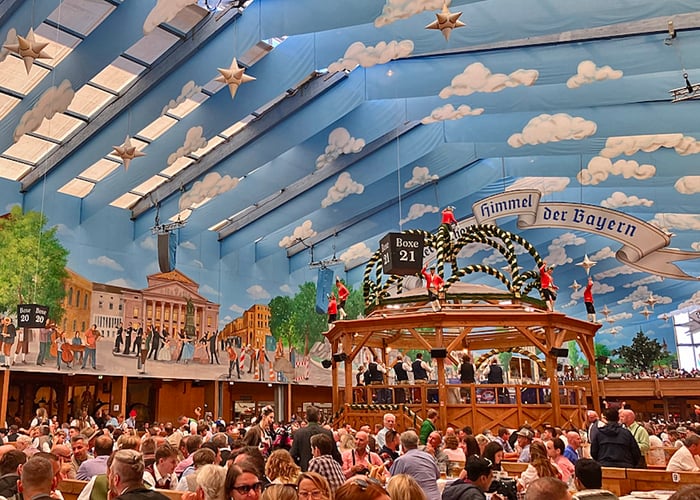Fun and Surprising Facts About Oktoberfest in Germany
If you’re planning your first trip to Munich, chances are Oktoberfest is high on your to-do list. Beyond the steins of beer and rowdy beer tents, this world-famous festival is steeped in history, quirky traditions, and plenty of surprises. To help you experience it like more than just a tourist, we’ve rounded up the most interesting facts about Oktoberfest that every traveler should know before raising a glass.
Whether you’re curious about how many people go to Oktoberfest annually, want to learn some fun cultural tidbits, or simply love a good story, these insights will make your visit even more memorable.
A Royal Wedding Started It All
One of the most surprising facts about Oktoberfest in Germany is its origin story. The first celebration was held in 1810 to mark the wedding of Crown Prince Ludwig (later King Ludwig I) and Princess Therese of Saxe-Hildburghausen. The citizens of Munich were invited to join in on the festivities, which ended with a grand horse race in a large field just outside of the city center. That field, or meadow, was later named Theresienwiese in honor of Princess Therese and Oktoberfest still takes place here each year. (That's why you might hear locals refer to Oktoberfest as simply 'Wiesn', referencing its location.) The event was such a hit that it became an annual tradition, evolving into the Oktoberfest we know today.
Oktoberfest Doesn’t Actually Start in October
Here’s a fun and unexpected twist: despite its name, Oktoberfest actually begins in September. The shift was made in the late 1800s to take advantage of warmer weather, ensuring visitors could enjoy outdoor festivities longer. Today, the celebration begins in mid-September and typically continues until the first Sunday in October, unless that Sunday falls before German Unity Day (October 3), in which case Oktoberfest is extended through the holiday. For 2025, Oktoberfest will run from Saturday, September 19th through Sunday, October 4th.
How Many People Go to Oktoberfest? Millions.
When it comes to scale, Oktoberfest is unmatched. Each year, more than six million people from across the globe descend upon Munich to join the party. That’s more than the population of Denmark squeezed into beer tents, fairgrounds, and the streets of Munich. With that many visitors, it’s worth planning ahead and making sure you book your hotels for Munich early. Additionally, if you are planning on doing any sightseeing during your time in Munich (we love Munich Nymphenburg Palace and the Munich Residenz), consider booking your tickets in advance since the city will be busier than usual!
Keep in mind that the busiest days to attend Oktoberfest are, of course, the weekends. The busiest weekend is the middle weekend of the festivities, also called Italian Weekend. Italian Weekend for Oktoberfest 2026 is September 25-28. For the smallest crowds, consider shifting your plans to attend Oktoberfest during the week. Tuesdays are family days, so the carnival rides will be busier than usual, but we found the crowds inside the beer tents to be quite manageable.
Check out our Ultimate Guide to Oktoberfest Munich for even more insider tips about attending Oktoberfest in Munich.
Only Beer Brewed in Munich
One of the most famous facts about Oktoberfest regards its exclusive beer rules. Only beer brewed within Munich’s city limits by one of the six traditional breweries (Hofbräu, Paulaner, Hacker-Pschorr, Löwenbräu, Spaten, and Augustiner) can be served at Oktoberfest Munich.
Additionally, one common misconception is that Oktoberfest offers beer sampling or tasting opportunities. You won't see flights of beer or multiple options here! Instead, each brewery brews a special Festbier, or golden lager for Oktoberfest. The beer is around 6% ABV, which is a bit stronger than the average American beer, so be sure to stay hydrated and enjoy plenty of food as you partake in the festivities.

Beer is also always poured in a Maß (one-liter glass stein), although half-liters can also be purchased, but you will have to ask specifically for a half-liter. If beer is not your thing, some tents serve radlers, which are a mix of beer and lemonade. Not all beer tents served radlers, from our experience; Paulaner and Hofbräu did, while Hacker-Pschorr and Augustiner did not. Otherwise, there is a wine tent - Weinzelt - that you can visit for wine, sparkling wine, and champagne.
Food Is Just as Important as the Beer
For foodies, Oktoberfest is paradise for Bavarian food. Beyond pretzels the size of your head, the festival features roasted chickens, hearty sausages, pork knuckles, and schnitzel. Traditional Bavarian dishes are central to the experience, offering a delicious way to understand the region’s culture and soak up some of beer!
Outside of the beer tents, you will also find tons of more food options, including: candied nuts, sausages, käsespätzle, grilled fish, and sweet desserts. Those gingerbread hearts you’ll see everywhere, often worn as necklaces, may look adorable, but trust us, they’re far better as souvenirs than as snacks! (While technically edible, you won't want to actually eat them. Instead stick to many of the other delicious foods sold within the tents and across the Theresienwiese.

Looking to eat outside of the festival grounds? Dive into our Munich Travel Guide and discover some of our favorite restaurants in Munich.
Traditional Outfits Have Meaning
While you don't have to don the traditional Oktoberfest outfits, wearing lederhosen and dirndls is a part of the fun of attending Oktoberfest in Munich! These outfits have deep cultural roots and are symbols of Bavaria. Lederhosen, made from durable leather (and naturally waterproof), were once worn by Alpine farmers and hunters because they were practical for hard labor and outdoor work. Dirndls, meanwhile, originated as the practical yet regional attire of working women, born out of utility and function. By the 19th century, they were embraced by the upper classes as fashionable garments, crafted from luxurious materials like silk and lace. Today, locals wear them not just to honor tradition, but to showcase a sense of pride in their regional roots, making them an essential part of the festival’s authenticity.
If you’re planning to dress the part, check out our full post on Oktoberfest outfits.

Oktoberfest Has Been Canceled - Multiple Times
Wars, economic hardship, and even cholera outbreaks forced Oktoberfest to be canceled 26 times in its history. Most recently, the COVID-19 pandemic led to back-to-back cancellations in 2020 and 2021. Yet, each time the festival returns, it reminds locals and travelers alike of the resilience of Bavarian traditions.

There’s More Than Just Beer Tents
While the massive tents are the headline attraction, Oktoberfest is also home to lively parades, traditional folk music, carnival rides, cultural performances, and even a wine tent (Weinzelt).
However, most visitors do not realize that Oktoberfest is also a family-friendly affair! During the day especially, families flock to the fairgrounds to enjoy the carnival rides, food, and even the beer tents! (Although, children under the age of 6 are not allowed in the beer tents after 8:00 PM and children under 16 cannot be on the festival grounds after 8:00 PM unless they are accompanied by a parent or guardian.) Carnival rides take up a good amount of space within Theresienwiese including kid-friendly roller coasters, haunted houses, and an iconic Ferris wheel that offers incredible views of Munich! If you only have time for one carnival ride, make it the Ferris wheel!

For history lovers, or those eager to see a more traditional side of Oktoberfest Munich, there is also the Oide Wiesn to explore. The Oide Wiesn does have an admission fee (the rest of the Oktoberfest grounds are free to enter), but is filled with nostalgic rides, traditional music, cultural performances, and even a museum. For more information about Oide Wiesn, check out the official Oktoberfest website.
Why Facts About Oktoberfest Matter
Travel is about more than sightseeing, it’s about connection. Knowing these quirky, historical, and fun facts about Oktoberfest in Germany turns a bucket-list experience into a deeper cultural immersion. From learning why the festival starts in September to understanding the meaning behind a dirndl bow, you’ll feel less like an outsider and more like part of the tradition.
Ready to plan your trip? Start with our Ultimate Guide to Oktoberfest Munich, and don’t forget to explore the rest of our Munich Travel Guide to make the most of your time in Bavaria.
Share Your Oktoberfest Story
Have you been to Oktoberfest or is it on your travel bucket list? Drop a comment below and tell us which fact surprised you most! Or, if you snap a great stein photo this year, tag us @jetsetseeker!
|
|
About the Author: Lauren Del VecchioLauren Del Vecchio is the co-founder, lead writer, and creative director behind Jetset Seeker. A lifelong traveler and Florida native, she creates detailed, thoughtful travel guides, blogs, and itineraries shaped by her love of art, architecture, food, and culture. She combines firsthand experience with in-depth research to create content that is honest, practical, and written to help travelers understand a destination, not just visit it. |
%20(1).png?width=3690&height=2079&name=Jetset%20Seeker%20Logo%20(Banner)%20(1).png)





